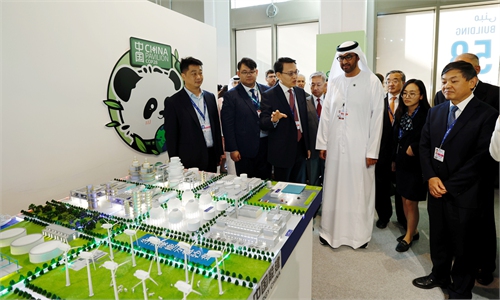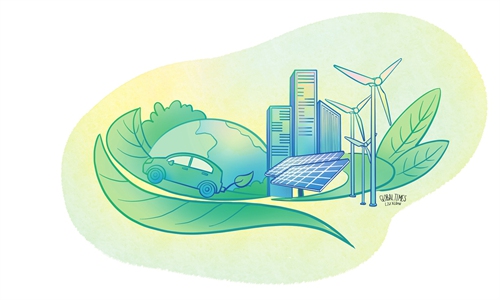
China Pavilion in the Blue Zone of Dubai Expo City is ready to welcome visitors during COP28 on November 29, 2023. Photo: Shan Jie/GT
US Special Presidential Envoy for Climate John Kerry said on Wednesday that the US will work with China to make the climate negotiations a success at the 28th session of the Conference of the Parties (COP28) to the United Nations Framework Convention on Climate Change, which is being held in Dubai from November 30 to December 12, Reuters reported.
Kerry's signaling of a positive approach to bilateral cooperation on climate change is a welcome development. For a long time, climate change issues have been affected by changes in overall China-US relations. Whenever bilateral relations show signs of improvement, climate change is often the first area to see a thaw.
Yet, global opinion appears to be cautious toward securing consensus at the COP28, with observers still waiting for more clarity. This is mainly because while promising to promote climate change cooperation in their official statements, US politicians often adopt a zero-sum mentality when it comes to action. The US climate change policy, which has been heavily influenced by geopolitical considerations, has set a bad example for global climate change cooperation, pointing to a drag on efforts toward global climate goals.
Against the backdrop of the COP28, the Biden administration is expected to release tax-credit rules on Friday that are being closely watched by the global market as to how far the US will distance its electric vehicle (EV) industry from China, The Wall Street Journal reported on Thursday.
The US last year revamped a $7,500 tax subsidy for people who buy new EVs to push automakers to rely less on Chinese supplies, but vagueness in implementation surfaced with the rules.
If the US explicitly blocks the subsidy for cars containing batteries, components or minerals made by Chinese companies, that could conflict with other goals set by the US in terms of boosting EV sales, mitigating climate change and supporting US automakers by reducing cost pressures.
The US' attempt to "decouple" the EV industry from China is also a microcosm of the conflict between the US excluding China from its supply chains and China-US climate change cooperation. As we all know, China plays a leading role in the global clean-energy industry, which has an important influence on global emissions reduction and climate change, and there is extensive cooperation potential between the two countries in the area of climate change.
In November, China and the US issued a joint statement on the Sunnylands Statement on Enhancing Cooperation to Address the Climate Crisis, with a working group to be set up to focus on areas including the energy transition, methane, the circular economy and resource efficiency, low-carbon efforts and deforestation, according to China's Ministry of Ecology and Environment.
These are positive developments, but if the US remains so resistant to technological, industrial and investment cooperation with China in clean-energy sectors and is determined to set up separate production and supply chains to exclude China, how much credibility does it have in implementing the Sunnylands Statement or any other climate change cooperation with China?
By comparison, China's climate change efforts are more consistent with its words. As a developing country with strong technology to reduce emissions, China has been at the forefront of promoting the implementation of the United Nations Framework Convention on Climate Change. China has always maintained an open and positive attitude on climate change cooperation with other countries.
Last but not the least, the fundamental way to deal with climate change is to promote the transition to green and low-carbon development. Given China's dominant role in the global clean-energy industry, there is no way for any party to exclude China in rebuilding the clean-energy industry chain.
This is also why we hope that China and the US can seize the current opportunity at the COP28 to reaffirm their commitment to work together on climate change and seek more pragmatic cooperation.



